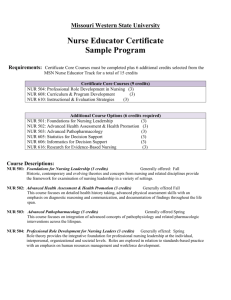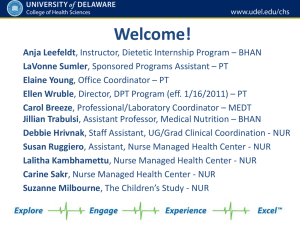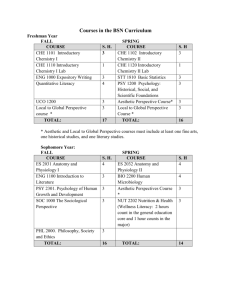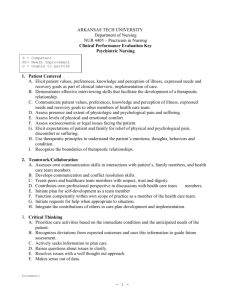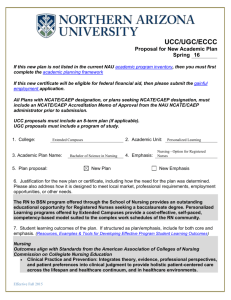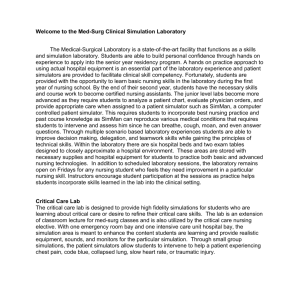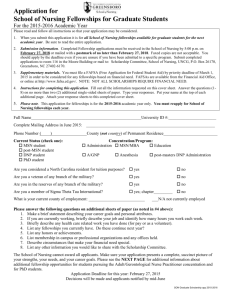NUR 211L - nau.edu - Northern Arizona University
advertisement
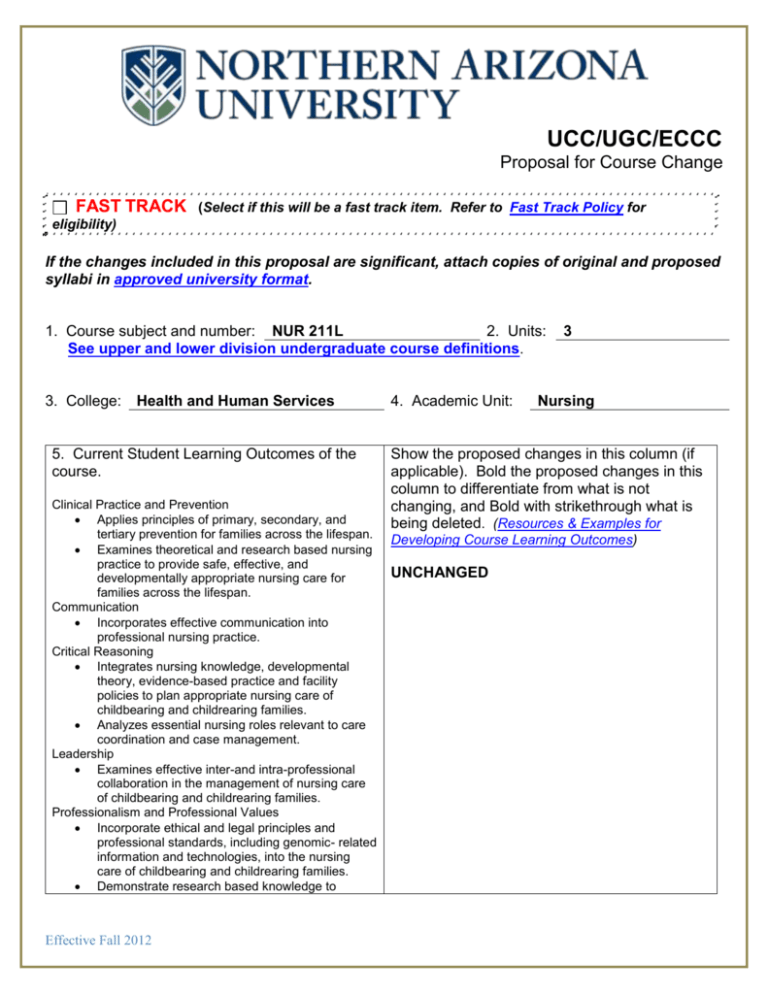
UCC/UGC/ECCC Proposal for Course Change FAST TRACK (Select if this will be a fast track item. Refer to Fast Track Policy for eligibility) If the changes included in this proposal are significant, attach copies of original and proposed syllabi in approved university format. 1. Course subject and number: NUR 211L 2. Units: See upper and lower division undergraduate course definitions. 3. College: Health and Human Services 5. Current Student Learning Outcomes of the course. Clinical Practice and Prevention Applies principles of primary, secondary, and tertiary prevention for families across the lifespan. Examines theoretical and research based nursing practice to provide safe, effective, and developmentally appropriate nursing care for families across the lifespan. Communication Incorporates effective communication into professional nursing practice. Critical Reasoning Integrates nursing knowledge, developmental theory, evidence-based practice and facility policies to plan appropriate nursing care of childbearing and childrearing families. Analyzes essential nursing roles relevant to care coordination and case management. Leadership Examines effective inter-and intra-professional collaboration in the management of nursing care of childbearing and childrearing families. Professionalism and Professional Values Incorporate ethical and legal principles and professional standards, including genomic- related information and technologies, into the nursing care of childbearing and childrearing families. Demonstrate research based knowledge to Effective Fall 2012 4. Academic Unit: 3 Nursing Show the proposed changes in this column (if applicable). Bold the proposed changes in this column to differentiate from what is not changing, and Bold with strikethrough what is being deleted. (Resources & Examples for Developing Course Learning Outcomes) UNCHANGED provide holistic care to patients of diverse backgrounds and needs. Global Health Promotes safety and quality of health care outcomes for diverse populations incorporating principles of advocacy, leadership and collaboration. Advocates for health equity and social justice for vulnerable populations and the elimination of health disparities both locally and globally. Participates in collaborative efforts to improve aspects of the environment that negatively impacts health both locally and globally. 6. Current title, description and units. Cut and paste, in its entirety, from the current on-line academic catalog* http://catalog.nau.edu/Catalog/. Show the proposed changes in this column Bold the proposed changes in this column to differentiate from what is not changing, and Bold with strikethrough what is being deleted. NUR 211L DEVELOPMENTAL AND HEALTH-ILLNESS TRANSITIONS OF CHILD BEARING AND CHILD-REARING FAMILIES PRACTICUM (3) Description: Required clinical practicum for developmental and health-illness transitions of childbearing and childrearing families. Letter grade only. Units: 3 Prerequisite: NUR 212, NUR 212L, NUR 216, NUR 216L Co requisite: NUR 211, NUR 350, NUR 350L NUR 211L 411L DEVELOPMENTAL AND HEALTH-ILLNESS TRANSITIONS OF CHILD BEARING AND CHILD-REARING FAMILIES PRACTICUM (3) Description: Required clinical practicum for developmental and health-illness transitions of childbearing and childrearing families. Letter grade only. Units: 3 Prerequisite: NUR 212, NUR 212L, NUR 216, NUR 216L NUR 347, NUR 347L, NUR 349, NUR 349L Co requisite: NUR 211 411, NUR 350, NUR 350L NUR 440, NUR 440L *if there has been a previously approved UCC/UGC/ECCC change since the last catalog year, please copy the approved text from the proposal form into this field. 7. Justification for course change. NUR 211 and 211L are required in the fourth semester of the professional program (first semester senior year). Course number change to upper division better reflects the course content and how it is currently offered. 8. Effective BEGINNING of what term and year? FALL 2015 See effective dates calendar. IN THE FOLLOWING SECTION, COMPLETE ONLY WHAT IS CHANGING CURRENT Current course subject and number: Effective Fall 2012 PROPOSED Proposed course subject and number: NUR 211L NUR 411L Current number of units: Proposed number of units: Current short course title: Proposed short course title (max 30 characters): Current long course title: Proposed long course title (max 100 characters): Current grading option: letter grade pass/fail or both Current repeat for additional units: Proposed grading option: letter grade pass/fail or both Proposed repeat for additional units: Current max number of units: Proposed max number of units: Current prerequisite: Current co-convene with: Proposed prerequisite (include rationale in the justification): Proposed co-requisite (include rationale in the justification): Proposed co-convene with: Current cross list with: Proposed cross list with: Current co-requisite: 9. Is this course in any plan (major, minor, or certificate) or sub plan (emphasis)? Yes No If yes, describe the impact. If applicable, include evidence of notification to and/or response from each impacted academic unit. Nursing; B.S.N. 10. Is there a related plan or sub plan change proposal being submitted? If no, explain. Yes 11. Does this course include combined lecture and lab components? Yes If yes, include the units specific to each component in the course description above. No No Answer 12-15 for UCC/ECCC only: 12. Is this course an approved Liberal Studies or Diversity course? If yes, select all that apply. Liberal Studies Diversity Yes No Yes No 14. Is this course listed in the Course Equivalency Guide? Yes No 15. Is this course a Shared Unique Numbering (SUN) course? Yes No 13. Do you want to remove the Liberal Studies or Diversity designation? If yes, select all that apply. Liberal Studies Diversity FLAGSTAFF MOUNTAIN CAMPUS Effective Fall 2012 Both Both Scott Galland Reviewed by Curriculum Process Associate 1/12/2015 Date Approvals: Department Chair/Unit Head (if appropriate) Date Chair of college curriculum committee Date Dean of college Date For Committee use only: UCC/UGC Approval Approved as submitted: Approved as modified: Date Yes Yes No No EXTENDED CAMPUSES Reviewed by Curriculum Process Associate Date Approvals: Academic Unit Head Date Division Curriculum Committee (Yuma, Yavapai, or Personalized Learning) Date Division Administrator in Extended Campuses (Yuma, Yavapai, or Personalized Learning) Date Faculty Chair of Extended Campuses Curriculum Committee (Yuma, Yavapai, or Personalized Learning) Date Chief Academic Officer; Extended Campuses (or Designee) Date Effective Fall 2012 Approved as submitted: Approved as modified: Yes Yes No No CURRENT/PROPOSED SYLLABUS College of Health and Human Services School of Nursing Syllabus Fall 2014 NUR 211L 411L College of Health and Human Services School of Nursing Course Title: NUR 211L 411L Semester: Fall or Spring Credits: 3 credits (135 clock hours) Instructors & Addresses: Autumn Argent, MS, RNC-OB Nursing Building, #106 Office # 928-523-6712 Email: autumn.argent@nau.edu Laura Karnitschnig RN, MSN, CPNP Office: Room 106 Office # 928 523 0687 Email: laura.walker@nau.edu Donna Price RN, MS, CNM Office: Room 103 Office # 928-523-0319 Email: donna.price@nau.edu Sharon Thompson, MSN, RN Office: Room 218 Office # 928-523-7769 Email: Sharon.thompson@nau.edu Office Hours: As posted and by appointment Course prerequisites: NUR 212, NUR 212 L, NUR 216, NUR 216L NUR 347, NUR 347L, NUR 349, NUR 349L Effective Fall 2012 Course co-requisites: NUR 211, NUR 350, NUR 350L NUR 411, NUR 440, NUR 440L Course Description: This clinical practicum provides the opportunity to apply concepts from NUR 211L 411L. It is comprised of clinical laboratory, simulation, and patient care experiences with child-bearing and childrearing families. The focus of care includes hospital settings, clinics, schools, community and homes and involves health promotion, anticipatory guidance, family teaching, and clinical care. Course Structure and Approach: This clinical practicum provides the opportunities to develop skills, and to practice the integration of theory content, skills, critical reasoning in simulated and actual patient care activities. With laboratory, simulation, and clinical learning, nursing practice is fostered with the mentorship and guidance of faculty members and other professional nurses. Student Learning Outcomes: Upon completion of the course, the successful student Clinical Practice and Prevention Applies principles of primary, secondary, and tertiary prevention for families across the lifespan. Examines theoretical and research based nursing practice to provide safe, effective, and developmentally appropriate nursing care for families across the lifespan. Communication Incorporates effective communication into professional nursing practice. Critical Reasoning Integrates nursing knowledge, developmental theory, evidence-based practice and facility policies to plan appropriate nursing care of childbearing and childrearing families. Analyzes essential nursing roles relevant to care coordination and case management. Leadership Examines effective inter-and intra-professional collaboration in the management of nursing care of childbearing and childrearing families. Professionalism and Professional Values Incorporate ethical and legal principles and professional standards, including genomic- related information and technologies, into the nursing care of childbearing and childrearing families. Demonstrate research based knowledge to provide holistic care to patients of diverse backgrounds and needs. Global Health Promotes safety and quality of health care outcomes for diverse populations incorporating principles of advocacy, leadership and collaboration. Advocates for health equity and social justice for vulnerable populations and the elimination of health disparities both locally and globally. Participates in collaborative efforts to improve aspects of the environment that negatively impacts health both locally and globally. Required Textbooks: Effective Fall 2012 SimChart through Elsevier/evolve McKinney, E., James, S., Murray, S., Ashwill, J. (2013). Maternal-Child Nursing, 4th Edition. St Louis, Missouri: Elsevier Saunders. Recommended Textbooks: OB/GYN Peds Notes: Nurses Clinical Pocket Guide ISBN: 978-0-8036-2332-3 Nursing Drug reference handbook or med notes as indicated by lecture Ackley, B., Ladwig, G. (2011). Nursing Diagnosis Handbook. Supplemental materials/e-references: Additional readings may be placed in the Blackboard Learn course electronic-reserves file. Course Outline Week of/ Date Friday, 10/3/14 9am – 5pm Topic Clinical Orientation Pediatric Medication Exam Assignment Clinical Portfolio and Goals Bring to clinical orientation on Friday, 10/3, to be checked off by primary clinical faculty Monday 10/6/14 9am Medication retest Students who do not pass medication exam on 1st attempt will remediate and retest on Friday, 2/28 Week of 10/5/14 Simulation/Hospital Clinical/ SMASE NIP-It Modules Due on Sunday, 10/5 by midnight Hospital Preparation Paperwork Due on Sunday, 10/5 by midnight Simulation Preparation/Completion of Clinical Paperwork Week of 10/12/14 Simulation/ Hospital Clinical/ SMASE Simulation Preparation/Completion of Clinical Paperwork Week of 10/19/14 Simulation/ Hospital Clinical/ SMASE Simulation Preparation/Completion of Clinical Paperwork Week of 10/26/14 Simulation/ Hospital Clinical/ SMASE Simulation Preparation/Completion of Clinical Paperwork Week of 11/2/14 Simulation/Hospital Clinical/ SMASE Simulation Preparation/Completion of Clinical Paperwork Week of 11/9/14 Simulation/ Hospital Clinical/ SMASE Simulation Preparation/Completion of Clinical Paperwork Week of 11/16/14 Simulation/Hospital Clinical/ SMASE Week of 11/23/14 No Clinical Simulation Preparation/Completion of Clinical Paperwork Thanksgiving Holiday! Week of 11/30/14 Simulation/Hospital Clinical/ SMASE Clinical Paperwork/ Write-ups Due Final Clinical Evaluations Assessment of Student Learning Effective Fall 2012 Simulation Preparation/Completion of Clinical Paperwork Continuing Education, Community Education & Critical Thinking Clinical Paperwork Due Due Mon., 12/1/14 by midnight Clinical Self Evaluation, Clinical Portfolio & Goals Due Mon., 12/1/14 to primary clinical faculty Evaluation Tool Ft. Defiance Hospital & SMASE Points 30 Math exam (100% required in order to pass meds & continue in clinical course) FMC Clinical Rotations 3 points for 100% on first attempt 2 points for 100% on second attempt 1 point for 100% on third attempt 28 Clinical Simulation 30 Hospital Preparation Paperwork (2) 2 (1 point each) NIP-It Immunization Module 1 Community Education 1 NAH Continuing Education 1 Critical Thinking Lab 1 Final Clinical Self Evaluation 1 Clinical Portfolio 1 Clinical Goals 1 Students are required to attend all clinical experiences. Students are required to complete 135 clinical hours for this course Total P/F 100 points Methods of Assessment: Student learning and professional role development is assessed over the course of the semester, in various clinical settings, and evaluated using various measures. *Note- this information is subject to change and is to be used as a guideline; see Bb learn course clinical shell for full assignment information. Math Test: Math test must be passed with a score of 100% prior to attending clinical. The student will have the opportunity to remediate and take a math retest up to two additional times, for the total of 3 attempts. If the student is unable to pass the math test upon the third attempts, the student will be unable to attend clinical, resulting in a failure in the course. Community Education: Students are required to complete community education at one of three events: Fantastic Voyage, NAU Sex Fest, Power Me From A to Z Continuing Education: Students are required to complete 4 hours of OB and/or pediatric continuing education through on-line webinars or in-person. For on-line webinars, student need to register on-line for webinar access through Northern Arizona Healthcare @ https://services.nahealth.com/Learning/ (see instructions posted on Bb learn clinical shell). Childbirth education classes are available free of charge to students (see class schedule posted on Bb learn clinical shell). A maximum of 2 students are able to attend each class (first Effective Fall 2012 come, first serve basis). Students are required to sign up through Professor Autumn Argent for all in person childbirth education classes. Inpatient Clinical Experience: Students will rotate at Flagstaff Medical Center and Fort Defiance Indian Hospital. * Note: Obstetric and Pediatric patient populations vary (please be flexible). Variation in assignments can be expected. Clinical Simulation Experience: Simulation is a clinical experience in which the student will work through structured obstetric and pediatric scenarios. Simulation is a clinical experience to practice new and previously learned clinical skills. The simulation lab is a clinical experience in which a clinical instructor can refer a student who has demonstrated the need for additional practice or remediation on skill/skills required for mastery. Clinical simulation is scheduled as part of clinical hours and included into the clinical schedule. SMASE/Ft Defiance: This clinical experience will take place on site in Window Rock and Fort Defiance. Plan to travel to Window Rock the afternoon before your clinical experience is set to begin. Plan to make hotel arrangements for two nights on the Reservation at either Quality Inn in Window Rock, AZ or the Navajoland Inn and Suites in St. Michaels, AZ. SMASE or St. Michael’s Association for Special Education is a school with on-site group homes for severely developmentally disabled children and adults. This clinical experience will provide the student with the opportunity to observe and participate in the care of pediatric patients within the school or clinic setting. This experience can include: health screenings, assessment of child with developmental disabilities and/or the child with complaints of illness/injury and administration of medications under the direction of the school or clinical instructor in the school or clinic setting. Critical Thinking Lab: Students are required to complete 4 hours in the critical thinking lab with Michelle Musich. Critical thinking labs are to enhance and implement student analysis and application of patient scenarios. Multiple labs will be available for student convenience. It is recommended that you sign up as soon as possible to reserve your attendance in the lab. NIP-It Immunizations Modules: ALL students are required to complete the NIP-It immunization module on-line. This is an independent assignment. This assignment counts as clinical time and failure to complete this assignment will impact your ability to successfully complete this clinical course. The NIP-IT immunization module is located on-line. There is no cost if you do not sign up for "official" CE certification. You will receive completion certificates free of cost with quiz module completion. You will need to register to gain access to the modules and print out the certificate forms. There are six modules and four hours will be given for completion. There is a quiz after each module which you need to pass with an 80%. You will receive an email with a link for a Effective Fall 2012 certificate after each module completion. Please print and submit the completed certificates for verification. Modules are available at: http://nip-it.org/index.cfm Timeline for Assessment: See course outline and Blackboard Learn for due dates. Grading System: The NAU SON grading scale is as follows. No rounding. 93-100% A 84-92% B 78-83% C <78 % F (failing) Course Policies There is strict adherence to every part of the NAU Student Handbook and the School of Nursing Undergraduate Student Handbook 1. All assignments must be submitted by the due date and time. Late assignments will not be accepted. All assignments will be due on Sundays at Midnight. Failure to complete assignments on time could result in failure to meet course objectives. 2. Students who have a catastrophic or emergency event which may prevent submission of an assignment by the deadline may request, in writing, to the faculty, as far in advance as possible, but no later than 24 hours before, permission to submit a late assignment. Approval of any such request is at the discretion of the faculty. 3. All assignments are to be completed by each student individually without the help of others unless specifically identified as a group project or the student has been directed to seek help from a designated NAU tutor or teaching assistant. 4. Wikipedia is not considered an acceptable, valid, or reliable resource for use in any School of Nursing coursework. One purpose of this course is to help students identify, appraise, and utilize valid and reliable professional resources. Wikipedia does not meet these criteria. Makeup tests and retests There are no quizzes or exams in this course. Attendance Policy: You are expected to attend ALL CLINICAL sessions (this INCLUDES ORIENTATIONS, LAB SESSIONS, SIMULATIONS, AND PRE/POST CONFERENCES). Failure to attend clinical will prevent you from meeting clinical course objectives. Failure to notify faculty of absence from clinical (INCLUDING LAB AND POST CONFERENCE) prior to missing or being late will be considered as unprofessional conduct and will be handled as such. Notification must be made by phone (we do not have access to e-mail at the clinical sites). Academic Dishonesty/Plagiarism: All forms of student academic dishonesty, including cheating, fabrication, facilitating academic dishonesty and plagiarism are prohibited and subject to disciplinary action. Cheating means intentionally using or attempting to use unauthorized materials, information or study aids in any academic exercise. Fabrication means intentional and unauthorized falsification or invention of any information or citation in an academic exercise. Plagiarism means intentionally or knowingly representing the words or ideas of another, as one's own in any academic exercise. For further explanation of academic dishonesty refer to the School of Nursing Undergraduate Student Handbook and Northern Arizona University Student Handbook. Effective Fall 2012 University Policies Review the following policies available on the Northern Arizona University Policy Statement website http://www4.nau.edu/avpaa/UCCPolicy/plcystmt.html: 1. Safe Environment Policy 2. Students with Disabilities Policy 3. Academic Contact Hour Policy 4. Academic Integrity Policy (also see http://home.nau.edu/images/userimages/awf/9476/ACADEMIC%20DISHONESTY.pdf) 5. Research Integrity Policy 6. Sensitive Course Materials Policy 7. Classroom Disruption Policy (also see http://nau.edu/uploadedFiles/Administrative/EMSA_Sites/Folder_Templates/_Forms/Classroo m_Disruption_Policy.pdf) Effective Fall 2012
